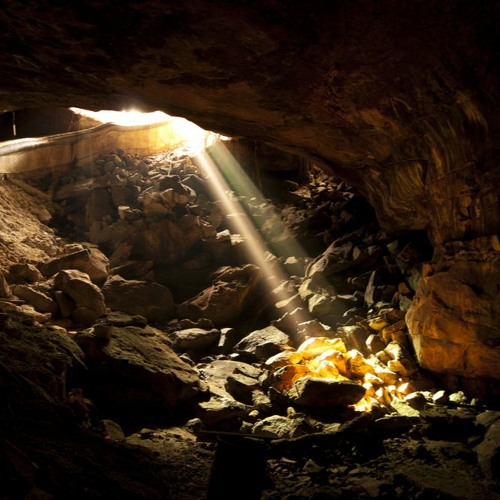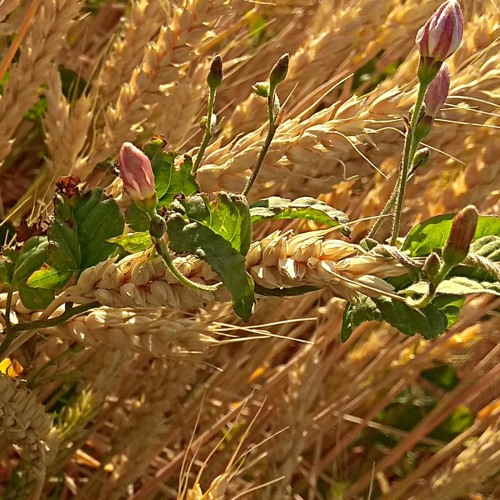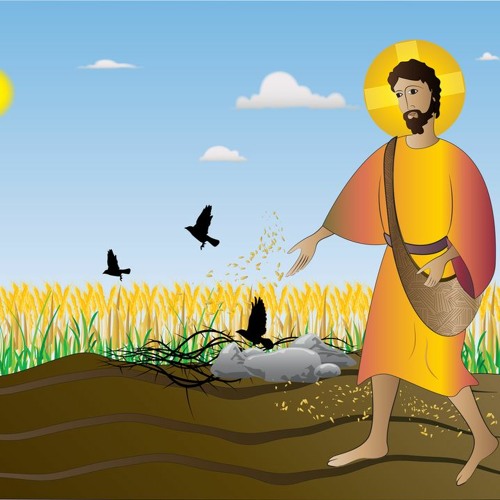Seventeenth Sunday in Ordinary Time. Year A - Sunday, July 26, 2020
EPISODE 242

Readings for 17th Sunday in Ordinary Time - A
FIRST READING: 1 Kings 3:5, 7-12
Psalm 119:57+72, 76-77, 127-28, 129-30. "Lord, I love your commands."
SECOND READING: Romans 8:28-30
GOSPEL ACCLAMATION, (cf. Matthew 11:25).Alleluia, alleluia! Blessed are you, Father, Lord of Heaven and earth. You have revealed to little ones the mysteries of the Kingdom.
GOSPEL: Matthew 13:44-52 or 13:44-46
Image Credit: Shutterstock Licensed stock photo ID: 80573221. Single beam from the sun that shines into the mouth of a cave. By berserg
++++
Please listen to my audio recordings of the readings, prayers and reflections for the Seventeenth Sunday in Ordinary Time. Year A - Sunday, July 26, 2020 by clicking this link here: https://soundcloud.com/user-633212303/faith-hope-and-love-ordinary-17a-episode-242 (EPISODE: 242)
+++++
Prologue: In the parable, a man discovers a treasure in a field and sells EVERYTHING else he has, in order that he could HAVE THAT treasure. The Treasure of infinite value is God's Kingdom,..// Jesus' good news…// being united forever with Jesus in God's family……/ IT IS LIKE A RARE TREASURE… Nothing else on earth is as valuable as this…… It is worth giving up everything else to attain it…//… It has a richness and a depth that can never be fully plumbed {As I read that parable of the treasure in the field….…..I am reminded of the quote from G.K. Chesterton, (the great English scholar and writer)… (and I am paraphrasing it liberally here)…. He writes….. 'It's not that Christianity hasn't worked, it is just that nobody's really tried it yet !' } (actually, the correct quote is: "The Christian ideal has not been tried and found wanting. It has been found difficult; and left untried." ― G.K. Chesterton, In "What's Wrong with the World"). Our faith is a treasure of incredible depth… if one thinks they have grasped it enough to 'find it wanting'… I am really not sure where they have been digging………..The gospel continues to be priceless and precious; worthy of all our efforts to explore. … May God, who has so graciously accompanied and given success to our work so often in the past, continue this good work in us and bring it to perfection.
++++++
17th SUNDAY-ORDINARY TIME-YEAR-A-2020
Aren't you just a little envious of Solomon being invited by God to, "Ask what you would like me to give you". What a tantalising question. Give yourself a moment before you answer, but what would you ask for?
Then you might ask yourself, "did Solomon get it right?", when he asked for wisdom when there would have been so many more immediately gratifying things to request. What about heaps of money or excellent health, or if he was less selfish world peace or an end to poverty. The list is endless, or at least my list is.
Of course, it's the great riddle of life: why would he ask for something that he already had. Why do we always want more of what we already have, when we don't use all that we have got?
In some way, all of us are treasure hunters, looking for the next new thing that will make us completely happy, yet we always seem to be looking for something more. Not unlike a child who is frustrated when they can't grab another biscuit because both hands are already full. We seem to be more fearful of a future that might run out of what we need, rather than relishing a present that is providing all that is necessary.
Mind you, Jesus loves the searcher, the seeker, even if we go searching in the wrong places sometimes. The problem is that we are usually searching for success or riches – the things that will make life easier –rather than the things that will make life more meaningful. In doing this we tend to miss out on the whole purpose of life. How to live best, not easiest.
For the Christian, the fine pearl of the parable is our faith, our relationship with God, not that we feel we ever really grasp the full value of this precious thing, but the search for the pearl commits us to seek and discover direction, purpose and answers.
When Solomon asked for wisdom, he found out that he could have an easy life, if that he really wanted but it wouldn't teach him the reason for life. Wisdom taught him how to dig for the real treasures of life, not hidden in the ground, but already in his grasp.
Once again we discover that Jesus' own perception of life differs sharply from so many people's. He was constantly challenging people to see and see again in order to understand anew. To that purpose, his stories turned much of popular wisdom on its head, and this was done in the hope that his listeners might catch something of another way of living in God's world. In effect, Jesus had what Solomon prayed for – a heart to discern the ways of the people and the ways of God, as well as determination to close the gap between the two ways.
We know that Jesus had to give up everything he values – his family, his home, his security – to do his Father's will and preach the kingdom of God. For Jesus there is o treasure greater than his Father's will: when he uncovered what it was, he renounced everything to make it his own.
We realistically know that none of us can gain anything of value without renouncing something. Perhaps what we have to renounce first is our perception of what real treasure in life really is. For some this realisation comes early in life, for others, it is a lifelong search. For people of faith the real treasure of life in right under our noses – in the people we share life with, in the opportunities in life we face every day to live the values of Jesus. Yet we all try to look elsewhere for fulfilment, hoping that the treasure will fall into our lap, realising that none of this might appear as a glittering prize, but may be found in the ordinariness and the common-place events of each day, not hidden deeply in the complexities of life. Perhaps it is a clearer vision we should be asking from God. Vision to see what is already ours and to see past what does not bring us fulfilment.
+++++
References:
homily: fr peter Dillon.
Prologue: Fr Paul W. Kelly
Image Credit: Shutterstock Licensed stock photo ID: 80573221. Single beam from the sun that shines into the mouth of a cave. By Berserg
Seventeenth Sunday in Ordinary Time. Year A (Sunday, July 26, 2020) (EPISODE: 242 )
The grace of our Lord Jesus Christ, and the love of God, and the communion of the Holy Spirit be with you all.
+++++++++++++
{{Good wishes to you all.}}
Coming together as Gods family, let us call to mind our sins.
Lord Jesus, you call your people to turn away from sin: Lord, have mercy//You teach us wisdom, and write your truth in our inmost heart: Christ, have mercy//You forgive sins through the ministry of reconciliation: Lord, have mercy//
May almighty God have mercy on us, forgive us our sins, and bring us to everlasting life. Amen.
+++++++++++++++++++++
Memorial Acclamation
1. We proclaim your Death, O Lord, and profess your Resurrection until you come again.
++++++++++++++++++++++++++
PREFACE: Sundays Ordinary VII
Euch prayer II
Communion side. pwk: LH
(OPENING THEME VARIATION: 1)
++++
{{I pray that you have a wonderful and grace-filled week.}}
Go forth, the Mass is ended.
++++++++
Archive of homilies and reflections: http://homilycatholic.blogspot.com.au
To contact Fr. Paul, please email: paulwkelly68@gmail.com
To listen to my weekly homily audio podcast, please click this link here.
NB - It is often a week or so Ahead: https://soundcloud.com/user-633212303/tracks
You are welcome to subscribe to Fr Paul's homily mail-out by sending an email to this address: paulkellyreflections+subscribe@googlegroups.com
Further information relating to the audio productions linked to this Blog:
"Faith, Hope and Love - Christian worship and reflection" - Led by Rev Paul Kelly
Prayers and chants — Roman Missal, 3rd edition, © 2010, The International Commission on English in the liturgy. (ICEL)
Scriptures - New Revised Standard Version: © 1989, and 2009 by the NCC-USA. (National Council of Churches of Christ - USA)
"The Psalms" ©1963, 2009, The Grail - Collins publishers.
Prayers of the Faithful - " Together we pray," by Robert Borg'. E.J. Dwyer, Publishers, (1993) . (Sydney Australia).
Sung "Mass In Honour of St. Ralph Sherwin" - By Jeffrey M. Ostrowski. The ….Gloria, Copyright © 2011 ccwatershed.org.
- "Faith, Hope and Love" theme hymn - in memory of William John Kelly - Inspired by 1 Corinthians 13:1-13. Music by Paul W. Kelly. Arranged and sung, with additional lyrics by Stefan Kelk. 2019.
"Quiet Time." Instrumental Reflection music. Written by Paul W Kelly. 1988, 2007. & This arrangement Stefan Kelk 2020.
- "Today I Arise" - For Tricia J Kelly. Original words and music by Paul W. Kelly. Inspired by St Patrick's Prayer. Arranged and sung, with additional lyrics by Stefan Kelk. 2019.
May God bless and keep you.
+++++++++++++++++++++++++++++


